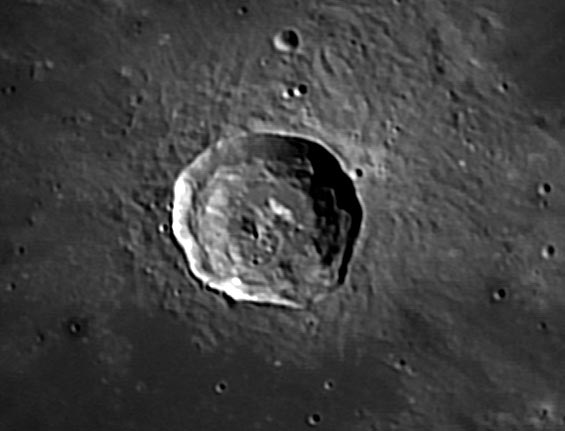
image by <a xhref="mailto:mwirths@superaje.com">Mike Wirths</a>
This is an encore of an excellent LPOD from March 3, 2005. I hope you re-enjoy it!
There are about 600 named craters on the lunar nearside, but I would guess that contributors have sent LPOD good images of at most about 10% of them. Everyone knows the superstar craters that get almost all of an observer’s attention, but the more humdrum craters have stories to tell us too. For example, here is 39 km wide Manilius – can you find it in Rukl’s Atlas of the Moon without using the index? Mike’s view has nearly the same sun illumination as the Lunar Orbiter IV image but his exposure is better and his image lacks those obnoxious horizontal framelet lines! The top half of the wall of Manilius appears to mostly be a very sharp scarp – if you started to slide you wouldn’t stop until you reached the mounds of talus half way down. Only along the southeastern and eastern rims are crude terraces still attached to the wall, everywhere else they have slid down, crowding the floor. There is a hint of layering at the very top of the northern rim where a delicate shadow marks a ridge that can be traced partway around that part of the rim. The floor of Manilius has two largish peaks and some hills surrounded by smooth material. If the material were dark at high Sun I’d say it was mare, but it isn’t so perhaps it is impact melt. Unrelated to Manilius itself is the small dark halo crater to its west. It looks like this is the type of dark halo crater that results from an impact that excavates fresh mare material and scatters it over a thin surficial layer of brighter material.
Technical Details:
18 Jan, 2005. Temp -21C. Starmaster 18″ + Atik B&W webcam + 5X’s Barlow + IR passband filter + Registax 2 + Images Plus.
Related Links:
Rükl charts 23 & 34
You can support LPOD when you buy ANY book from Amazon thru LPOD
COMMENTS?
Register, and click on the Discussion tab at the top of the page.



